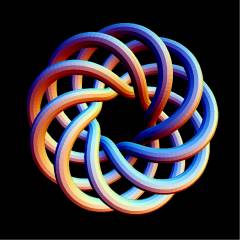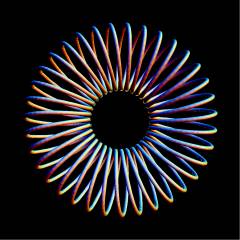T(9,5)
|
|
|

|
See other torus knots |
| Edit T(9,5) Quick Notes
|
Edit T(9,5) Further Notes and Views
Knot presentations
| Planar diagram presentation | X51,37,52,36 X66,38,67,37 X9,39,10,38 X24,40,25,39 X67,53,68,52 X10,54,11,53 X25,55,26,54 X40,56,41,55 X11,69,12,68 X26,70,27,69 X41,71,42,70 X56,72,57,71 X27,13,28,12 X42,14,43,13 X57,15,58,14 X72,16,1,15 X43,29,44,28 X58,30,59,29 X1,31,2,30 X16,32,17,31 X59,45,60,44 X2,46,3,45 X17,47,18,46 X32,48,33,47 X3,61,4,60 X18,62,19,61 X33,63,34,62 X48,64,49,63 X19,5,20,4 X34,6,35,5 X49,7,50,6 X64,8,65,7 X35,21,36,20 X50,22,51,21 X65,23,66,22 X8,24,9,23 |
| Gauss code | -19, -22, -25, 29, 30, 31, 32, -36, -3, -6, -9, 13, 14, 15, 16, -20, -23, -26, -29, 33, 34, 35, 36, -4, -7, -10, -13, 17, 18, 19, 20, -24, -27, -30, -33, 1, 2, 3, 4, -8, -11, -14, -17, 21, 22, 23, 24, -28, -31, -34, -1, 5, 6, 7, 8, -12, -15, -18, -21, 25, 26, 27, 28, -32, -35, -2, -5, 9, 10, 11, 12, -16 |
| Dowker-Thistlethwaite code | 30 60 -34 -64 38 68 -42 -72 46 4 -50 -8 54 12 -58 -16 62 20 -66 -24 70 28 -2 -32 6 36 -10 -40 14 44 -18 -48 22 52 -26 -56 |
| Braid presentation |
Polynomial invariants
| Alexander polynomial | [math]\displaystyle{ t^{16}-t^{15}+t^{11}-t^{10}+t^7-t^5+t^2-1+ t^{-2} - t^{-5} + t^{-7} - t^{-10} + t^{-11} - t^{-15} + t^{-16} }[/math] |
| Conway polynomial | [math]\displaystyle{ z^{32}+31 z^{30}+434 z^{28}+3627 z^{26}+20150 z^{24}+78431 z^{22}+219625 z^{20}+447240 z^{18}+661810 z^{16}+703851 z^{14}+526423 z^{12}+267421 z^{10}+87560 z^8+17094 z^6+1772 z^4+80 z^2+1 }[/math] |
| 2nd Alexander ideal (db, data sources) | [math]\displaystyle{ \{1\} }[/math] |
| Determinant and Signature | { 1, 24 } |
| Jones polynomial | [math]\displaystyle{ -q^{28}-q^{26}+q^{20}+q^{18}+q^{16} }[/math] |
| HOMFLY-PT polynomial (db, data sources) | Data:T(9,5)/HOMFLYPT Polynomial |
| Kauffman polynomial (db, data sources) | Data:T(9,5)/Kauffman Polynomial |
| The A2 invariant | Data:T(9,5)/QuantumInvariant/A2/1,0 |
| The G2 invariant | Data:T(9,5)/QuantumInvariant/G2/1,0 |
KnotTheory`, as shown in the (simulated) Mathematica session below. Your input (in red) is realistic; all else should have the same content as in a real mathematica session, but with different formatting. This Mathematica session is also available (albeit only for the knot 5_2) as the notebook PolynomialInvariantsSession.nb.
(The path below may be different on your system, and possibly also the KnotTheory` date)
In[1]:=
|
AppendTo[$Path, "C:/drorbn/projects/KAtlas/"];
<< KnotTheory`
|
Loading KnotTheory` version of August 31, 2006, 11:25:27.5625.
|
In[3]:=
|
K = Knot["T(9,5)"];
|
In[4]:=
|
Alexander[K][t]
|
KnotTheory::loading: Loading precomputed data in PD4Knots`.
|
Out[4]=
|
[math]\displaystyle{ t^{16}-t^{15}+t^{11}-t^{10}+t^7-t^5+t^2-1+ t^{-2} - t^{-5} + t^{-7} - t^{-10} + t^{-11} - t^{-15} + t^{-16} }[/math] |
In[5]:=
|
Conway[K][z]
|
Out[5]=
|
[math]\displaystyle{ z^{32}+31 z^{30}+434 z^{28}+3627 z^{26}+20150 z^{24}+78431 z^{22}+219625 z^{20}+447240 z^{18}+661810 z^{16}+703851 z^{14}+526423 z^{12}+267421 z^{10}+87560 z^8+17094 z^6+1772 z^4+80 z^2+1 }[/math] |
In[6]:=
|
Alexander[K, 2][t]
|
KnotTheory::credits: The program Alexander[K, r] to compute Alexander ideals was written by Jana Archibald at the University of Toronto in the summer of 2005.
|
Out[6]=
|
[math]\displaystyle{ \{1\} }[/math] |
In[7]:=
|
{KnotDet[K], KnotSignature[K]}
|
Out[7]=
|
{ 1, 24 } |
In[8]:=
|
Jones[K][q]
|
KnotTheory::loading: Loading precomputed data in Jones4Knots`.
|
Out[8]=
|
[math]\displaystyle{ -q^{28}-q^{26}+q^{20}+q^{18}+q^{16} }[/math] |
In[9]:=
|
HOMFLYPT[K][a, z]
|
KnotTheory::credits: The HOMFLYPT program was written by Scott Morrison.
|
Out[9]=
|
Data:T(9,5)/HOMFLYPT Polynomial |
In[10]:=
|
Kauffman[K][a, z]
|
KnotTheory::loading: Loading precomputed data in Kauffman4Knots`.
|
Out[10]=
|
Data:T(9,5)/Kauffman Polynomial |
"Similar" Knots (within the Atlas)
Same Alexander/Conway Polynomial: {}
Same Jones Polynomial (up to mirroring, [math]\displaystyle{ q\leftrightarrow q^{-1} }[/math]): {}
KnotTheory`. Your input (in red) is realistic; all else should have the same content as in a real mathematica session, but with different formatting.
(The path below may be different on your system, and possibly also the KnotTheory` date)
In[1]:=
|
AppendTo[$Path, "C:/drorbn/projects/KAtlas/"];
<< KnotTheory`
|
Loading KnotTheory` version of May 31, 2006, 14:15:20.091.
|
In[3]:=
|
K = Knot["T(9,5)"];
|
In[4]:=
|
{A = Alexander[K][t], J = Jones[K][q]}
|
KnotTheory::loading: Loading precomputed data in PD4Knots`.
|
KnotTheory::loading: Loading precomputed data in Jones4Knots`.
|
Out[4]=
|
{ [math]\displaystyle{ t^{16}-t^{15}+t^{11}-t^{10}+t^7-t^5+t^2-1+ t^{-2} - t^{-5} + t^{-7} - t^{-10} + t^{-11} - t^{-15} + t^{-16} }[/math], [math]\displaystyle{ -q^{28}-q^{26}+q^{20}+q^{18}+q^{16} }[/math] } |
In[5]:=
|
DeleteCases[Select[AllKnots[], (A === Alexander[#][t]) &], K]
|
KnotTheory::loading: Loading precomputed data in DTCode4KnotsTo11`.
|
KnotTheory::credits: The GaussCode to PD conversion was written by Siddarth Sankaran at the University of Toronto in the summer of 2005.
|
Out[5]=
|
{} |
In[6]:=
|
DeleteCases[
Select[
AllKnots[],
(J === Jones[#][q] || (J /. q -> 1/q) === Jones[#][q]) &
],
K
]
|
KnotTheory::loading: Loading precomputed data in Jones4Knots11`.
|
Out[6]=
|
{} |
Vassiliev invariants
| V2 and V3: | (80, 600) |
| V2,1 through V6,9: |
|
V2,1 through V6,9 were provided by Petr Dunin-Barkowski <barkovs@itep.ru>, Andrey Smirnov <asmirnov@itep.ru>, and Alexei Sleptsov <sleptsov@itep.ru> and uploaded on October 2010 by User:Drorbn. Note that they are normalized differently than V2 and V3.
Khovanov Homology
| The coefficients of the monomials [math]\displaystyle{ t^rq^j }[/math] are shown, along with their alternating sums [math]\displaystyle{ \chi }[/math] (fixed [math]\displaystyle{ j }[/math], alternation over [math]\displaystyle{ r }[/math]). The squares with yellow highlighting are those on the "critical diagonals", where [math]\displaystyle{ j-2r=s+1 }[/math] or [math]\displaystyle{ j-2r=s-1 }[/math], where [math]\displaystyle{ s= }[/math]24 is the signature of T(9,5). Nonzero entries off the critical diagonals (if any exist) are highlighted in red. |
|
| Integral Khovanov Homology
(db, data source) |
|
Computer Talk
Much of the above data can be recomputed by Mathematica using the package KnotTheory`. See A Sample KnotTheory` Session.
Modifying This Page
| Read me first: Modifying Knot Pages
See/edit the Torus Knot Page master template (intermediate). See/edit the Torus Knot_Splice_Base (expert). Back to the top. |
|
